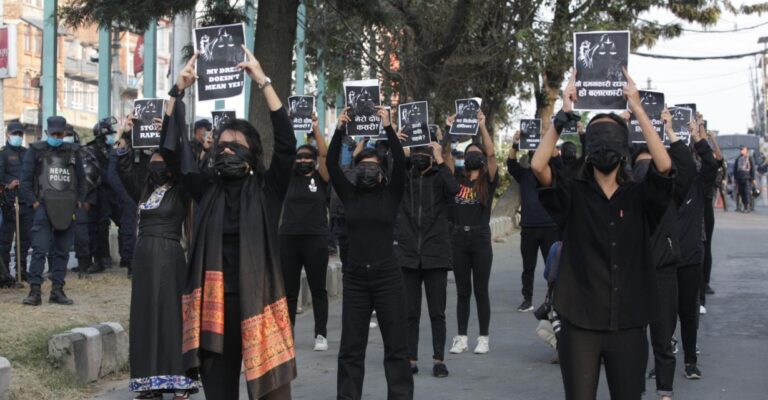
The latest report by Nepal Police paints Nepal’s grim reality of increasing rape cases as an average of seven women and girls were raped in the last fiscal year.
As per the report, mostly of the rapists were acquaintances, neighbors, relatives or trusted persons of the survivors.
As many as 2,534 cases of rape were reported to Nepal Police in 2020-21 against 2,144 of previous fiscal, an increase by 18.19 per cent. A total of 1,480 rape cases were reported in 2017/18.
It is important to note here that these are only reported cases, while many such incidents go unreported because police complaints show that many a times the perpetrators are survivors’ near ones including, but not limited to, acquaintances, close relatives, trusted persons, neighbors, grandfathers, fathers, father-in-laws, uncles, maternal uncles, brothers, brother-in-laws, landlords, boyfriends, teachers, husbands, divorced husbands and teachers.
Prevalent social- cultural attitudes and internalizing gender stereotypes also play a vital role in discoraging women from reporting rape.
Similarly, as many as 735 incidents of attempt-to-rape were reported in 2020-21 compared to 687 in 2019-20 – an increase of 6.99 per cent.
As per Article 201 (3) Nepal’s Criminal (Code) Act 2017, a person who commits rape shall be liable to imprisonment for a term of sixteen to twenty years, if she (the survivor) is a girl child below ten years of age; imprisonment for a term of fourteen to sixteen years, if she (the survivor) is a girl child who is ten years or above ten years of age but below fourteen years of age.
Similarly, imprisonment for a term of twelve to fourteen years, if she (the survivor) is a girl child who is fourteen or above fourteen years of age but below sixteen years of age; imprisonment for a term of ten to twelve years, if the woman (survivor) is sixteen or above sixteen years of age but below eighteen years of age; and imprisonment for a term of seven to ten years, if the woman (survivor) is eighteen or above eighteen years of age.
The law provisions punishment of up to life imprisonment (25 years) for anyone found guilty of incestuous rape. “If a biological mother or son or father or daughter is raped, the guilty shall be liable to life imprisonment,” the law states.
Senior Superintendent of Police as well as Nepal Police Spokesperson Basant Bahadur Kunwar said that the Police aimed to ensure that no rape case is settled through reconciliation between the perpetrators and victims, whether voluntary or under coercion and undue influence.
The Government of Nepal will be the plaintiff in a rape case and it can be settled only through judicial proceeding in accordance with the existing law.
Last year, the Office of Attorney General had issued a directive to the agencies concerned stating that the law prohibits reconciliation in criminal offences, which should be exclusively dealt with the government as plaintiff.
The directive came after reports emerged in the media regarding incidents of settlement of rape cases in different parts of the country through agreement between the perpetrators and victims in the presence of local representatives.
However, the written laws hardly translate into practice due to various reasons such as class, caste, gender and religious disparity hindering access to justice as well as lack of prompt and effective investigation, and hence the laws don’t always work in the survivors’ favor.
“The rape and killing of Nirmala Panta is another example. Despite public outrage, leading to several days of protests in Kanchanpur, those responsible for the case are yet to be identified. There has been a pattern of police negligence and abuses in the investigation, including the alleged mishandling of evidence and the wrongful arrest after which an innocent person was coerced to “confess” to the crime,” a report by International Commission of Jurists (ICJ) states.
“Meanwhile, the actual perpetrator has so far escaped justice. This impunity enables not only the perpetuation of similar violence but also erodes public trust in the justice system.”






